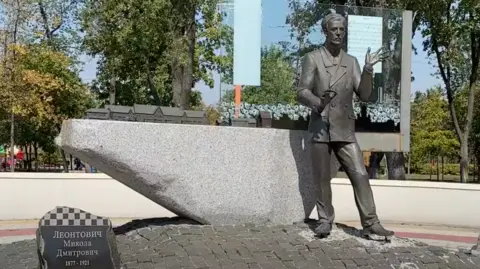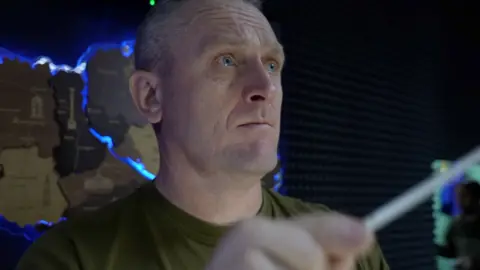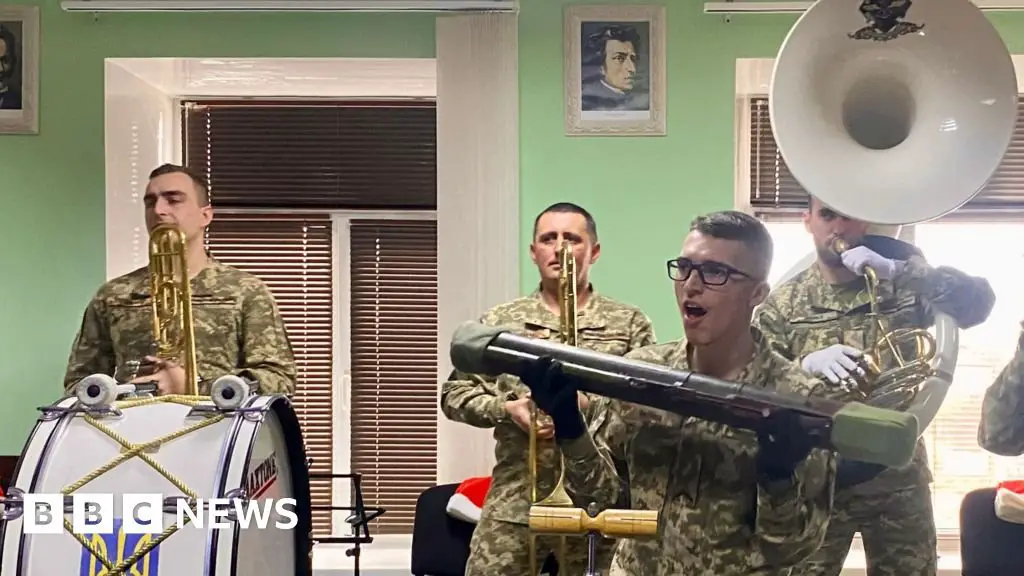Pokrovsk in eastern Ukraine is the birthplace of one of the world’s most popular Christmas carols.
But this year there is little sign of Christmas in the city. Just a hint of snow on deserted streets and flimsy buildings – and the constant sound of heavy shells.
Pokrovsk is Russia’s next destination. His troops are now less than two miles from the city center.
And it’s not just buildings and houses that are destroyed. Ukraine accuses Russia of also trying to erase its cultural identity – including its associations with this well-known Christmas song.
Most of Pokrovsk’s population has already fled. The gas supply has been cut off and many households are without electricity and water. Those who remain, like 59-year-old Ihor, only break cover to find essentials. He says it’s like living on a powder keg – you never know when or where the next shell will hit.
Oksana, 43, says she is too scared to leave her home, but during the lull in shelling she goes out to get wood and coal to keep warm.
She tells me she hopes Ukraine’s armed forces can hold the city, but she thinks that’s unlikely. Pokrovsk, she says, will probably fall.
 BBC/Imran Ali
BBC/Imran AliThe city has already prepared for the worst. The statue of their famous composer Mykola Leontovych has already been removed. The music school that bore his name now lies boarded up and empty.
Leontovych may not be well known in the West. But the song he composed is known all over the world – with its glockenspiel-like singing. It is believed that Leontovych wrote the composition’s early scores based on a Ukrainian folk song while living and working in Pokrovsk between 1904 and 1908.
 Suspilne Donbas
Suspilne DonbasIn Ukraine it is known as Shchedryk. It became known to most of the world as “Carol of the Bells” after American composer Peter Wilhousky wrote English lyrics for the song. The song’s use in the Hollywood film Home Alone helped increase its popularity.
Viktoria Ametova calls it “a masterpiece – Pokrovsk’s signature song.” Until recently, she also taught music in the city, at the school that bore Leontovych’s name.
She has now moved to the relative safety of Dnipro. Here, many former residents of Pokrovsk still try to keep the memories of their former home alive.
Beneath a salvaged portrait of Leontovych, Viktoria watches as 13-year-old Anna Hasych strikes the Christmas carol’s familiar chords on a piano.
 BBC/Kostas Kallergis
BBC/Kostas KallergisThe Hasych family fled Pokrovsk this summer. But they are determined not to forget the place they still call home. Anna’s mother Yulia says she is glad her daughters are practicing Shchedryk. “We will not forget the history of our city,” she says.
The melody brings back memories for Anna. “When I played it at home, it seemed happy. It reminded me of winter and Christmas,” she says. “Now it’s more of a sad song for me because it reminds me of my homeland and I really want to go back.”
But for a Ukrainian military band, Shchedryk has become a song that inspires resistance. They even play it in the trenches – using guns as improvised instruments.
They may be musicians, but their commander reminds me that they are soldiers first. All have spent time on the front lines. Colonel Bohdan Zadorozhnyy, the band’s leader and its conductor, says the song helps lift the soldiers’ spirits. “These beats and rhythms cheer up the boys at the front and inspire them to fight,” he says.
22-year-old Roman uses a rocket launcher case filled with rice, which he shakes vigorously to the beat of the music. Shchedryk, he says, is the “pride of our country, it’s freedom, it’s in our souls, I get goosebumps from this song.”
Colonel Zadorozhnyy says Shchedryk shows that Ukraine is a civilized nation now at war and fighting for its identity.
 BBC/Imran Ali
BBC/Imran AliPokrovsk could well fall into Russian hands. But people do everything to preserve their culture and identity.
The director of the Pokrovsk History Museum, Angelina Rozhkova, has already recovered and brought to safety most of his valuable possessions – including artifacts from Leontovych’s life in Pokrovsk.
Russia, she says, doesn’t just want to take over Ukraine’s territory – “it wants to destroy our culture and everything that is valuable to us.”
Angelina says the people of Pokrovsk understand that they may never return, “but our hearts and souls do not accept that.” That’s why they do everything they can to preserve the past. The new motto is “Keeping and saving means winning”.
It’s hard to say you win when your city is destroyed. But its people, like Leontovych’s music, show extraordinary resilience.
Leontovych’s life came to an abrupt end in 1921 when he was shot by a Soviet agent. Its composition had become a symbol of the fight for Ukrainian independence. It still is.
Additional reporting by Hanna Chornous and Anastasiia Levchenko






